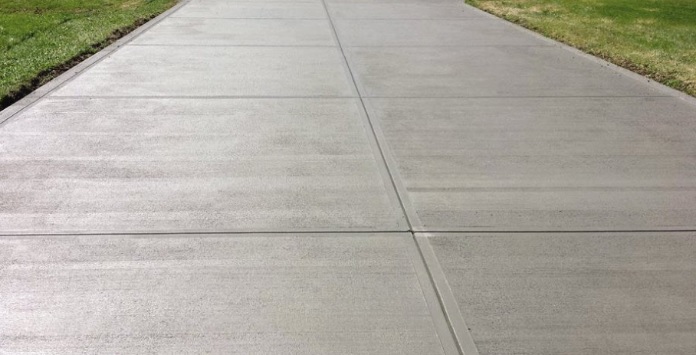The best way to protect your concrete driveway against freeze thaw and salt damage is to seal it using a penetrating concrete sealer or an acrylic sealer.
Penetrating concrete sealers penetrate into the concrete where they chemically react below the surface without changing the look or color of the concrete. They help to REDUCE damage and deterioration caused by the absorption of water, snow and ice, and salt. Acrylic sealers leave behind a protective surface film that takes the abuse for the concrete, STOPPING damage and deterioration caused by the absorption of water, snow and ice, and salt. While sealers do a fantastic job at reducing damage and deterioration, damage and deterioration can still occur because the surface of the concrete is still exposed.
| Silicate Concrete Sealers | Water Repellent Concrete Sealers | Acrylic Concrete Sealers |
| Won’t change the look of the concrete | Won’t change the look of the concrete | Enhances with a wet look or gloss |
| Works entirely below the surface | Works entirely below the surface | Leaves a visible surface film |
| Apply only once | Recoat every 5-7 years | Recoat every 1-3 years |
| Increase strength of concrete | Repels surface water | Protects surface against staining |
| Reduces dusting and spalling | Reduces staining and deterioration | Stops dusting, staining, deterioration |
| Can only be used on cured concrete | Can be used on cured and uncured concrete | Can be used on cured and uncured concrete |
The two main types of penetrating sealers are silicate densifiers and water repellent sealers. Silicate densifiers only need to be applied once, and they are designed to increase the strength and density of the concrete by forming a permanent calcium silicate hydrate (CSH) barrier within the pores. The reduce dusting and deterioration caused by surface abrasion, salt abrasion, and week concrete. They do NOT repel water and other liquids off the surface, and for that reason offer little to no protection against freeze-thaw damage because water will still be absorbed into the pores where it can freeze. Under the category of silicate densifiers there are lithium silicate concrete sealers and sodium silicate concrete sealers. Both spark the same chemical reaction and form the same CSH structure within the pores, lithium silicate concrete sealers are just commonly used on dense concrete because of their small molecule size, and sodium silicate concrete sealers are commonly used on porous concrete because of their large molecule size.
Best Sodium Silicate Concrete Sealers:
- Armor S2000 Concrete Sealer Review (concentrated)
- Stone Technolgies X-1 Concrete Sealer Review (pre-diluted)
- Ashford Formula Concrete Sealer Review (pre-diluted)
Best Lithium Silicate Concrete Sealers:
- Armor L3000 Concrete Sealer Review (concentrated)
- Lion Hard Concrete Sealer Review (pre-diluted)
Water repellent sealers chemically react to form a water repellent barrier in the pores that causes water and other liquids to bead off the surface. They can’t stop damage and deterioration caused by surface abrasion or salt abrasion, but they reduce damage caused by freeze-thaw cycles because they prevent water from freezing within the pores. Under the category of water repellent sealers there are Silane-Siloxane hybrid sealers and Siliconate sealers. Siliconate water repellent sealers can leave behind a semi-permanent white residue when applied to dark concrete, brick, or pavers and should only be used on light or white concrete. Silane-Siloxane hybrid sealers can be applied to virtually all concrete, brick, and paver surfaces without issue.
Best Silane-Siloxane Water Repellent Sealers:
- Eagle Natural Seal (average 4.0 star review)
- Armor SX5000 Concrete Sealer Review (average 4.8 star review)
- Siloxane PD Concrete Sealer Review (average 4.5 star review)
- Okon S-20 Concrete Sealer Review (average 4.0 star review)
- Thompson’s Water Seal Concrete Sealer Review (average 3.2 star review)
Best Siliconate Water Repellent Sealers:
- Armor SC25 Siliconate Concrete Sealer (average 5.0 star review)
If you want complete protection, you want a coating. The best type of concrete driveway coating is an acrylic sealer. Acrylic sealers are very easy to apply, and leave behind a durable, UV resistant surface coating. The two best acrylic sealers to use are acrylic lacquers and acrylic co-polymers. Both types of acrylic sealers are available in water and solvent based solutions. One type isn’t necessarily better than the other, but there are several differences when it comes to application, life, and maintenance.
| Water Based Acrylic Sealers | Solvent Based Acrylic Sealers |
| Won’t darken the concrete | Will darken the concrete |
| Repaired by removal | Repaired with Xylene |
| Requires screen sanding before recoat | No prep required for recoat |
| Can’t add a non slip additive | Can add a non slip additive |
| No VOC | Low VOC |
Best Solvent Based Acrylic Concrete Sealers:
- Eagle High Gloss Sealer (average 4.6 star review)
- Armor AR350 Wet Look Sealer (average 4.8 star review)
- Armor AR500 High Gloss Sealer (average 4.9 star review)
- Enduraseal SB Acrylic Sealer (average 4.5 star review)
Best Water Based Acrylic Concrete Sealers:
- Seal-Krete Clear Seal Acrylic Sealer (average 4 star review)
- Armor WB25 Acrylic Sealer (average 4.9 star review)

